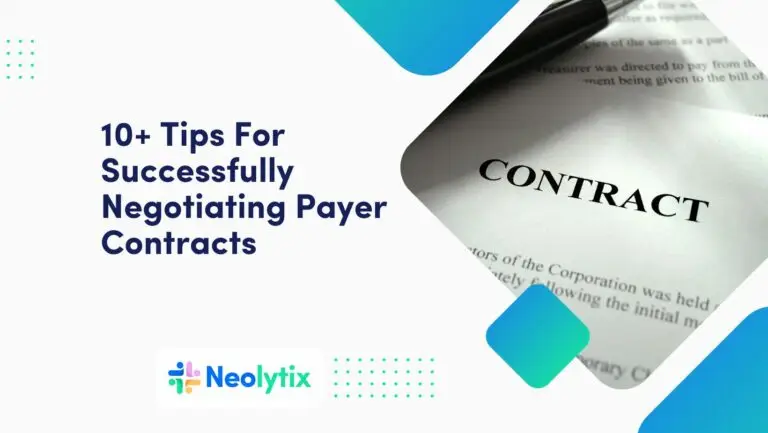The ability to effectively negotiate payer contracts is more than just a financial necessity; it’s a strategic imperative that can define the success of a healthcare organization. Mastering these negotiations ensures not only increased revenue and better reimbursement rates but also enhances provider autonomy, allowing for greater focus on patient care and service innovation.
Decoding Payer Contracts - Understanding the Essentials
Payer contracts are agreements between healthcare providers and insurance companies that outline the terms of patient care reimbursement. Understanding key terms such as fee-for-service, CPT codes (Current Procedural Terminology used for billing), and reimbursement rates is crucial.
These contracts often have specified renewal dates, making it essential for healthcare providers to know these details to prepare for renegotiations effectively.
The Foundation of Negotiation - Harnessing Data to Fortify Your Position
Effective negotiations are supported by robust data. Performance metrics and financial data serve as objective evidence that strengthens your bargaining position.
Strategic Approaches to Contract Negotiation
- Gather Comprehensive Data: Before negotiations begin, compile and analyze extensive data on your practice’s performance, payer payment patterns, and industry benchmarks to strengthen your negotiating position.
- Regular Contract Reviews: Make sure your contracts are up-to-date and reflective of both current healthcare trends and your practice’s evolving needs. This allows you to identify and prepare for renegotiation opportunities.
- Understand and Articulate Your Value: Clearly define and communicate the unique benefits your practice offers, such as specialized services or high patient satisfaction rates, which justify better contract terms.
- Employ a Checklist: Develop and adhere to a comprehensive checklist that covers all crucial aspects of your contracts, such as payment terms, service scope, and termination clauses, to avoid oversights.
- Build Strong Relationships with Payers: Establish and maintain positive relationships with payer representatives. Open lines of communication can lead to better mutual understanding and more favorable negotiation outcomes.
Advanced Tips for Negotiating Payer Contracts
- Strategic Use of Carve-outs and Exclusions: Negotiate carve-outs or exclusions for specific services where your practice can command a higher fee. This can be especially beneficial for procedures or treatments that are unique to your practice or where you have demonstrated particularly high efficiency or outcomes.
- Legal Leverage and Protection: Involve legal expertise to scrutinize the finer details of the contract, ensuring that clauses do not unfavorably bind your practice and that compliance with all regulatory requirements is maintained. This is critical during significant changes like mergers, acquisitions, or major shifts in service offerings.
- Utilize Data-Driven Insights: Base your negotiation strategies on solid data, including performance metrics and financial analytics, to build a compelling case for better terms.
Navigating Contract Renewals and Terminations
Successfully navigating the lifecycle of payer contracts, including renewals and terminations, is crucial for maintaining service continuity and financial stability. Here are four key tips to manage these critical stages effectively:
- Proactively Prepare for Renewal Discussions: Begin preparing for renewal negotiations well in advance of the contract’s expiration date. This preparation should include a review of all contractual obligations met and any metrics or targets exceeded. Use this data to justify better terms or rate increases in the renewal contract.
- Negotiate Flexibility for Future Changes: Healthcare is a dynamic field, with frequent changes in technology, regulation, and patient needs. Negotiate terms that allow for adjustments based on significant changes in your practice or the broader healthcare environment without severe penalties.
- Establish Clear Terms for Termination: Define clear conditions under which both parties can terminate the contract. This includes detailing what constitutes a breach of contract, as well as the process and timeline for termination notifications. Ensure that you also negotiate terms that cover the continuation of care and payments during the transition period after termination.
- Use Terminations as a Strategic Tool: While contract termination is typically seen as a last resort, it can sometimes serve as a strategic tool to renegotiate terms that are more favorable or to exit agreements that are no longer beneficial. Always analyze the potential impacts on your practice’s operations and reputation in the long run before deciding to terminate a contract.
Building Long-term Strategic Success and Aligning with Future Healthcare Trends
Long-term success in payer contract negotiations involves more than occasional adjustments; it requires a strategic alignment with larger networks or the adoption of value-based care models, which can substantially improve bargaining power and financial outcomes.
- Align with Value-Based Care Models: As the healthcare industry shifts towards value-based care, align your practice with these models by negotiating contracts that reward outcome efficiencies and patient satisfaction, rather than the volume of services provided.
- Anticipate and Adapt to Industry Changes: Stay informed about trends and changes in the healthcare industry, such as technological advancements or shifts in regulatory policies, and be ready to adapt your negotiation strategies accordingly.
- Expand Through Strategic Partnerships: Consider forming or joining larger networks, such as accountable care organizations (ACOs) or clinically integrated networks (CINs), which can increase your bargaining power and provide access to better contract opportunities with payers.
Securing Your Practice’s Future through Strategic Negotiations
Strategic payer contract negotiations are not just about achieving immediate financial gains—they are about setting a foundation for sustainable success. By adopting a thorough, legally sound, and strategically informed approach, practices can ensure favorable terms that support long-term profitability and operational efficiency.
Partner with Neolytix for Expert Contract Negotiation Support
Take your practice to the next level with Neolytix’s expert guidance in payer contract negotiations, medical billing, and a complete suite of services. Our team is ready to help you navigate the complexities of contract negotiations to secure the best possible outcomes for your healthcare organization.
Contact us today to start optimizing your payer contracts for a brighter, more secure future in healthcare.



